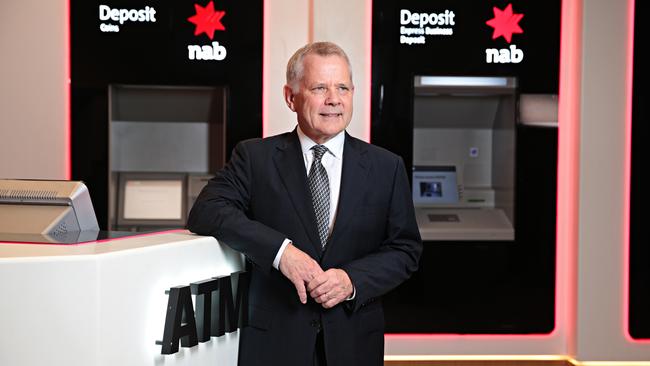Climate, ESG and Indigenous affairs dominate NAB board meeting in Darwin
Climate change, Indigenous affairs and the global environmental, social and government agenda dominated proceedings in NAB’s annual board meeting in regional Australia.

Climate change, Indigenous affairs and the global environmental, social and government agenda dominated proceedings in NAB’s annual board meeting in regional Australia.
After the board previously convened in towns like Cairns in north Queensland, Taree on the north coast of NSW and Mildura in northwest Victoria, directors will decamp from Darwin on Thursday after four days in the Northern Territory.
Chairman Phil Chronican acknowledged that the board, as a whole, did not have a “deep understanding” of the latest developments in carbon reduction technology, or the future of hydrogen as a replacement fuel.
“So we’re trying to improve our understanding of these issues before we get too far down the track,” Mr Chronican said.
The pathway to net zero emissions by 2050, he said, was clearer than the achievement of shorter-term outcomes by 2030.
This was because some of the harder-to-abate sectors, such as the steel and cement industries, required significant technological advances.
“But as a bank which banks many of those businesses, we have to think about our role and how we help people make the investments that are going to be required,” the chairman said. “That’s why it’s important that as a board we have an understanding of the technologies.
“So we’re not going to do a lot on the hydrogen issue at the moment, but obviously there’s a lot of expectation that hydrogen is going to play an important role.”

Directors, he said, would be visiting a number of carbon-reduction projects focused on the resources and agricultural industries. The territory’s competitive advantage in low-cost land and a conducive climate made it ideal for solar power generation, including the $30bn plan to build a giant solar farm to power Darwin, Indonesia and Singapore.
The plan moved a step closer to reality in March when billionaires Mike Cannon-Brookes and Andrew Forrest contributed $210m to a capital raising.
Mr Chronican also highlighted carbon-offsetting agricultural projects, and work underway to reduce the carbon intensity of the local gas industry.
With a new Labor administration committed to constitutional recognition of Aboriginal and Torres Strait Islander people, a further agenda item for the NAB board was the growing importance of Indigenous affairs.
“It’s raised the need for our board to get a good understanding of where Indigenous relationships are, so we’ve been meeting a number of different groups – land councils, private Indigenous businesses but also some of the more vocal activists,” Mr Chronican said.
“I wanted to make sure our board got a thorough understanding of the issues as the whole prospect of a referendum on the Uluru statement comes into the frame.
“NAB has a role to play because we operate in so many communities across Australia – we’re the largest bank in rural Australia so we can’t help but play a role.
“We’re obviously sensitive to the fact that a bank can only have so many views on issues at a point in time, so the first step is to have our board have a deep understanding of the issues.”



To join the conversation, please log in. Don't have an account? Register
Join the conversation, you are commenting as Logout